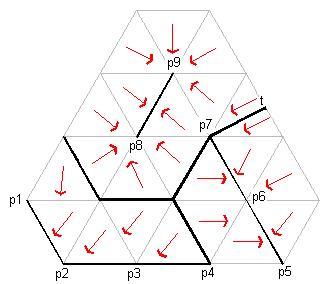If a point is at a lower elevation than all its neighboring TIN points, then when water flows to it, it has no downhill place to go. Similarly, a connected set of points that are at the same elevation and all of whose neighbors are at a higher elevation, is a single drain target. A depression is any such set of points.
If a watershed has this type of drain target, it is called a depression watershed.
In the following illustration, points p8 and p9 form a depression:

Ambiguous Depression
A depression watershed can be ambiguous. A watershed is ambiguous if it does not include any drain targets, but water flowing on it can reach more than one drain target.
An ambiguous depression occurs when the depression watershed depth is less than the threshold depth, but there are multiple neighboring watersheds at points of minimum elevation on the boundary.
When such a watershed fills to overflowing, water flows to all those neighboring watersheds, so it cannot be merged into any single watershed. Instead, Autodesk Civil 3D keeps it as a separate watershed and lists the neighboring watersheds into which it will drain.
Shallow Depression
If a point is at a lower elevation than all its neighboring TIN points, then water that flows to it has no downhill place to go. Similarly, a connected set of points that are at the same elevation, and all of whose neighbors are at higher elevation, is a single drain target. A depression is any such set of points.
A shallow depression is determined by the average depth of a depression, which is the average depth of the depression when it is filled to overflowing. This is determined by dividing the value of water in the depression by the area of the top surface of the water. A depression is considered part of the watershed it drains into (provided there is only one watershed it drains into) if its average depth is less than the user-set threshold.